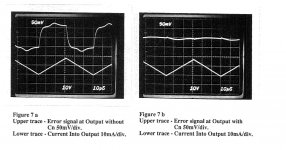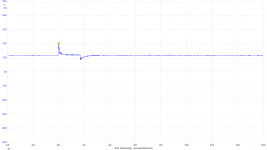There is a big misunderstanding in this forum between old guys, that worked on the bench and discovered many things by themself, long before somebody else put a name on it, and the younger that had an EE in university and an abstract and intellectual way to feel the things. See what I mean ? (...) his need to ride on his spurs, like a young rooster pushed him to become ridiculed.(...)
I am flattered; this young rooster is only a very few years away from retirement
 .
.
Last edited:
Yes, I believe it could be measurable too but is it measured? Any suggestions/thoughts on approach to doing this?
No problem at all, low frequency voltmeters with extreme resolution are certainly available.
I published this 27yr. ago. It's a simple demonstration of cancellation of the so called "back-emf" by the addition of a single capacitor (AD797). When Walt Jung did his super regulator for some reason he thought that somehow this was too confusing to include. Bruce Hofer of AP is the only person at the time that appreciated this.
Attachments
Since you asked: Don't know if you recognize UCLA (they have a good reputation), but a Masters is not required for PhD.Yes. John Westlake is a self taught designer who didn't received a formal university education and learnt electronics by observing his father's work. In general, self taught is ok, at least to start with; but to me is not good enough to land an ultimate expert status in any engineering domain. With the notable exception of high end audio, of course.
There's another thing that doesn't smell good to me; on his Wikipedia page it is stated black on white that he is now "preparing his Doctorate PhD research based on insight and understanding into an acoustic and system phenomenon observed over his career as an audio designer". If anybody knows a recognized University granting doctorates without graduating at Master level as a prerequisite, let me know.
69 here.I think Ovidiu is 61. I am 64. Young guys, right? 😀. Everything is relative.
PMA, I don't copy-you: I quoted this link as well, where is the misunderstanding ?You asked what he was doing about amplifiers. You quoted only half of my links. You did not quote
PGP Amplifier
which is a public resource with links to other schematics. So please play fair, jouer franc jeu, especially in case you ask not to insult.
Since you asked: Don't know if you recognize UCLA (they have a good reputation), but a Masters is not required for PhD.
I do, and you are wrong, at least for any Applied Science programs at UCLA.
Electrical & Computer Engineering | UCLA Graduate Programs (scroll down the long page).
UCLA said:Prerequisite. A UCLA master's degree in Electrical and Computer Engineering or a related field, or a comparable master's degree from an accredited institution.
Cocka-a-doodle-doo!
Totally agree!! Anywhere reference ground or reference voltage is needed, stability is paramount.
I would like to see stability measurements done on power supplies - just like Allan variance is done for some oscillators - might be interesting?
How about a measurement? I highly doubt it does anything but degrade performance.
Briefly from my archive. In-wall adapter ripple, power bank ripple, power bank output spectrum. Components for RME-ADI2.
Yes it is, as a power supply noise. Remove DC by a simple HF filter and then measure the rail by scope and frequency analyzer. You can get sensitivity as high as you wish and BW as you wish.
No problem at all, low frequency voltmeters with extreme resolution are certainly available.
I published this 27yr. ago. It's a simple demonstration of cancellation of the so called "back-emf" by the addition of a single capacitor (AD797). When Walt Jung did his super regulator for some reason he thought that somehow this was too confusing to include. Bruce Hofer of AP is the only person at the time that appreciated this.
Thanks guys
But... stability is being spoken of in relation to the device being powered during processing dynamic signals & hence the current requirements of the device are dynamically changing. Hence the noise stability of the PS is what is in question under these conditions.
So of course I would believe these measurements need to be taken when the device being powered is processing dynamic signals.
Any measurements for such conditions?
PMA, I don't copy-you: I quoted this link as well, where is the misunderstanding ?
Oh, sorry! I have overlooked you quoted both links. Old eyes, you know 😉
Thanks guys
But... stability is being spoken of in relation to the device being powered during processing dynamic signals & hence the current requirements of the device are dynamically changing. Hence the noise stability of the PS is what is in question under these conditions.
So of course I would believe these measurements need to be taken when the device being powered is processing dynamic signals.
Any measurements for such conditions?
Yes, of course 🙂. It is a sudden jump of load current of about 1A. But please take into account this is an input DC voltage for the RME-ADI. Inside is the additional voltage stabilizer, I was asked to measure input DC.
Attachments
Last edited:
Don't you think he has listened to a non sigma-delta DAC sometime in the past 25-30 years? They aren't exactly new. He's also expressed preference for high-res 24/96 and up, so I highly doubt PCM1704 will deliver anything he is looking for. He will never like Redbook.
Yes, I'm sure he has, but I'm not convinced he has heard a really good
one. Too many negative digital comments.
Try to be just a little less combative and a little more receptive. 🙂
If you run all your up-sampling and format conversion in the computer using
HQplayer, then go USB out to a JLsounds bridge (galvanically isolated and
re-clocked) this can then directly feed a PCM1704 DAC and run it up to 24 /
768kHz. That sounds pretty Hi Rez to me?
This basically bypasses a whole lot of, to a larger or lesser degree,
compromised crap, used in DAC's for the last 20 years - and improves upon
it. IOW, no PLL driven VCXO's, no ASRC chips, no ASIC or even FPGA based
digital filters.
The DAC side runs synchronous with fixed, very low phase noise clocks. Very
simple, very effective.
I suggested this arrangement to Mark4 a long time ago to help him short cut
development time, run Sabre in it's most primitive (and potentially highest
performance) mode. You can then play with filters, modulators, direct DSD,
in HQplayer and see what subjectively you feel matters the most.
Then it's a case of analog stages and power supplies. For the 1704, this is
much easier, for Sabre it is more difficult, for the new AK4499, extremely
difficult.
These are the reasons I suggested the 1704 (for John). It's a very 'analog'
sounding DAC, will do Hi Rez but is not too hard to implement.
No good if you want DSD or to develop a new product.
Clear as mud? 🙂
T
So of course I would believe these measurements need to be taken when the device being powered is processing dynamic signals.
Any measurements for such conditions?
There is no technical problem in doing this, why anyone would spend their time and energy is another question.
Yes, I'm sure he has, but I'm not convinced he has heard a really good
one. Too many negative digital comments.
Try to be just a little less combative and a little more receptive. 🙂
If you run all your up-sampling and format conversion in the computer using
HQplayer, then go USB out to a JLsounds bridge (galvanically isolated and
re-clocked) this can then directly feed a PCM1704 DAC and run it up to 24 /
768kHz. That sounds pretty Hi Rez to me?
This basically bypasses a whole lot of, to a larger or lesser degree,
compromised crap, used in DAC's for the last 20 years - and improves upon
it. IOW, no PLL driven VCXO's, no ASRC chips, no ASIC or even FPGA based
digital filters.
The DAC side runs synchronous with fixed, very low phase noise clocks. Very
simple, very effective.
I suggested this arrangement to Mark4 a long time ago to help him short cut
development time, run Sabre in it's most primitive (and potentially highest
performance) mode. You can then play with filters, modulators, direct DSD,
in HQplayer and see what subjectively you feel matters the most.
Then it's a case of analog stages and power supplies. For the 1704, this is
much easier, for Sabre it is more difficult, for the new AK4499, extremely
difficult.
These are the reasons I suggested the 1704 (for John). It's a very 'analog'
sounding DAC, will do Hi Rez but is not too hard to implement.
No good if you want DSD or to develop a new product.
Clear as mud? 🙂
T
You’re free to do what you think is best. Just let us not pretend this is actual truth or anything but your own opinion and subjective thoughts.
I have to say this. I have admiration for bench taught guys who achieve good things, but just sometimes it might be worth considering that those on here with PhDs might just have some insights for you to learn if you opened your mind to science...
Interesting ...... I too, have the greatest of respect for those of sufficient academic ability to gain a PhD, which requires seven years study to write a doctorate that no more than perhaps 250 people will read in the authors lifetime. It takes some guts and a lot of motivation (or blind faith!) in order to do that.
My own intellect is somewhat skewed by mathematical and musical dyslexia. Symbols and notation wobble and jump around the page - an eternally hopeless futility. It has made my own education somewhat difficult, but I have persevered and become a reasonably open minded generalist, someone who falls between the arts and sciences and is able to see the shades of grey in between. Sort of like Dave Bowman in 2001 - a very useful chap, and a childhood hero of mine.
I do listen very carefully to what is discussed here, even though most of it goes right over my head, and occasionally I am able to point out what to me is perfectly obvious in what is often overlooked in the heat of debate.
So, as one of the little people, I may seem a nuisance at times, but I mean well. ToS
Round and round we go........
I think the problem is in a discussion of people with very different background, professions, education, experience. Internet brought something that was impossible in the pre-internet era. Someone for whom this is a hobby asks "did anyone measure ......" just for the reason he does not know much about the subject, works in another field and popular magazines do not give the answers. We usually evaluate something based on our personal experience - difficult to see behind our own horizons and our own limits, whatever they are. So the debate becomes endless and turns in circles.
May-be it is not the eyes, but a wrong image you made of me ?Oh, sorry! I have overlooked you quoted both links. Old eyes, you know 😉
Let's be friends, we could share our rheumatism problems around a drink in real life, I'm sure. ;-)
May-be it is not the eyes, but a wrong image you made of me ?
Let's be friends, we could share our rheumatism problems around a drink in real life, I'm sure. ;-)
Really nothing against you personally, Sir 🙂
- Status
- Not open for further replies.
- Home
- Member Areas
- The Lounge
- John Curl's Blowtorch preamplifier part III


